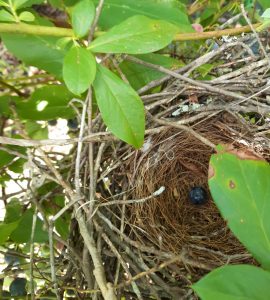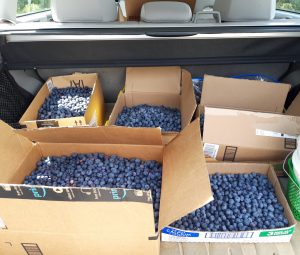By Jean Blish Siers *
Emily Dickinson wrote:
“Hope” is a thing with feathers
That perches in the soul,
And sings the tune without the words,
And never stops at all.
 Those words from her poem rattled around my head on a perfect June day, as a group of gleaners gathered to pick blueberries for local agencies. The farmer said we were helping her out: The bushes were heavy with fruit – actually bent to the ground – and if the ripe berries weren’t picked early in the week, they would attract bugs and disease and make picking more difficult for their paying customers on the weekend. We were thrilled to see the abundance of fruit waiting to be gathered.
Those words from her poem rattled around my head on a perfect June day, as a group of gleaners gathered to pick blueberries for local agencies. The farmer said we were helping her out: The bushes were heavy with fruit – actually bent to the ground – and if the ripe berries weren’t picked early in the week, they would attract bugs and disease and make picking more difficult for their paying customers on the weekend. We were thrilled to see the abundance of fruit waiting to be gathered.
As we began gleaning, we noticed a perfect bird’s nest tucked deep in the branches of the very first bush. And nestled inside that was a perfect blueberry! Maybe it’s just the crazy times we’re living through, but it reminded me of Dickinson’s poem. A hopeful symbol. A tune without words.
I look for signs of hope these days. Too often I hear about agencies swamped with new clients, trying to serve a 100% increase in demand with limited volunteers and usually no more money. I hear from rural churches that can’t participate like they usually do because COVID-19 has been so rampant in their communities they simply cannot get out.
Still, it was difficult to miss hopeful signs on Tuesday. Nine of us had driven to a U-Pick farm in an adjacent county to harvest their blueberries. The farm also sells flowers to florists and through farmer’s markets, and we couldn’t have asked for a lovelier spot to glean, with acres of flowers dancing around us in the cool breeze. Goldfinches flitted about, eating flower seeds. A hawk soared overhead.
For several of the gleaners, it was their first trip out of the city limits since the shutdown in March. We spread out to keep safe, but I noticed pretty much everyone stayed close enough to have conversations. Even the introverted among us crave social interaction these days, and gleaning is a chance to be outside, feel safe, be with people, and do good work.
 By the end of the morning, we’d picked about 140 pounds of beautiful organic blueberries. I’m not a math major, but I figured, at the grocery store, those berries would have cost about $900! We all know that folks with limited incomes can’t pay $5 a box for blueberries. It’s just not going to happen, no matter how good they are for their families. We loaded them into cars at the end of the morning and gleaners delivered to our local Meals-on-Wheels organization, a soup kitchen, a mobile food pantry delivering to under-served areas, and to Catholic Charities.
By the end of the morning, we’d picked about 140 pounds of beautiful organic blueberries. I’m not a math major, but I figured, at the grocery store, those berries would have cost about $900! We all know that folks with limited incomes can’t pay $5 a box for blueberries. It’s just not going to happen, no matter how good they are for their families. We loaded them into cars at the end of the morning and gleaners delivered to our local Meals-on-Wheels organization, a soup kitchen, a mobile food pantry delivering to under-served areas, and to Catholic Charities.
People are hurting. Unemployment is high, children are out of school and need food, seniors are afraid to leave their homes to shop, and hope can be hard to find. Leaving the field that morning, I remembered the bird’s nest. I remembered the people who had shared their morning cheerfully to pick food for others. I remembered the farmer who had saved our business card until she had something to share. And I thought, Emily Dickinson was right. Hope never stops at all.
* Jean Blish Siers is SoSA’s Western NC, Charlotte Area, and South Carolina Program Coordinator.
JUL
2020

